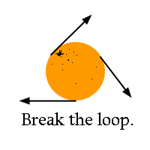

 | Tangentium |
All material on this site remains © the original authors: please see our submission guidelines for more information. If no author is shown material is © Drew Whitworth. For any reproduction beyond fair dealing, permission must be sought: e-mail drew@comp.leeds.ac.uk. ISSN number: 1746-4757 |
Feature essay: IT Education and Democratic PracticeDrew Whitworth, University of LeedsPage 1 ¦ Page 2 ¦ Page 3 ¦ Page 4 ¦ Printer-friendly version This essay examines the relationship between IT education and the needs of a democratic society. This first page reviews models of IT education which are currently favoured. It highlights problems which exist with them at the level of the individual student. Pages 2 and 3 expand on this review to ask why these may damage democracy in the UK (note that our focus is on the UK, although we hope the debate is relevant to other nations). Finally, page 4 reconsiders IT education in order that some of these problems can be addressed; albeit stressing the obstacles which will have to be surmounted. In 1970, Robert Wolff [1] suggested that it was the duty of every US citizen to familiarise themselves with debates within nuclear science, such as: the effects of fallout; the potential efficacy of shelters and government policies for keeping order after an attack; the mentality behind first-strike and second-strike strategies. He suggested that only through doing so could citizens make informed decisions when electing representatives who claimed to hold certain positions. More usefully, they could interrogate them on these positions, when it was the usual desire of candidates for office to gloss over these big questions in favour of more transient, but voter-friendly concerns such as tax and the state of the local train service. Nowadays we might make a similar suggestion with regard to government policies around the information society. Should we not ask politicians why, for instance, there is such a wide digital divide (whether on a global or UK scale [2], it is hard to dispute that cyberspace and the activities taking place there are essentially the realm of the affluent)? Must we simply accept the overt commercialisation of the online sphere, and its lack of management? Though the supermarket and the library may well be able to live side-by-side online [3], in neither of these buildings would one expect to see a sign for one product or sphere of knowledge, and yet when one arrives there, find something else. But this happens frequently online; in information management terms how can one justify typing www.volcano.com into a browser but then reaching a site for Fox Home Entertainment? These are just two ways in which our society's technical, political and conceptual relationship with information and information technology should be queried. And it has always been the role of higher and adult education to supply students with the knowledge needed to make such queries. The Dearing report (in section 5.11), as well as acknowledging the obvious need to take account of the concerns of industry, states plainly that the purposes of higher education are also:
Information and communication have vital roles to play in "shaping a democratic, civilised, inclusive society", as the subsequent pages of this essay will argue (see also this month's supporting essay). Many authors [4] have also recognised IT's pivotal position in the 21st century's global economy. Thanks to both factors, changes wrought by IT are of direct relevance to people's everyday lives. Therefore one would imagine that these issues would form an integral part of IT education (particularly, but not only, in universities). Unfortunately this is far from true. On the surface it appears as if IT provision within the UK education system is in a strong position. IT is a key skill, compulsory at every level. At a time when other disciplines, particularly in the "hard" sciences, are facing cutbacks, IT education seems relatively awash with resources and support. But the current trend in IT education is to focus primarily on "computerised office" skills, often in a standardised package (frequently using external sources such as the ECDL). However, there are several problems with this approach even at the level of the individual student:
Return to the top of this page Footnotes1. Wolff, Robert Paul (1998). In Defense of Anarchism. 2nd ed. Berkeley: University of California Press, p. 17. [return] 2. Selwyn, Neil and Stephen Gorard (2002). The Information Age: Technology, Learning and Exclusion in Wales. Cardiff: University of Wales Press, pp. 54-7. [return] 3. Gauntlett, David (2000). "Web Studies: A Userís Guide" in Gauntlett, D. (ed.), web.studies: Rewiring media studies for the digital age. London: Arnold, p. 11-12. [return] 4. See, for instance: Castells, Manuel (2000). The Rise of the Network Society, Oxford, Blackwell; Schiller, Herbert (1992), Mass Communications and American Empire, Oxford, Westview. [return] 5. Roszak, Theodore (1994). The Cult of Information. 2nd ed. Berkeley: University of California Press. pp. 91-107. [return]. 6. Shenk, David (1996): Data Smog: Surviving the Information Glut, San Francisco, Harper Edge. [return] | |